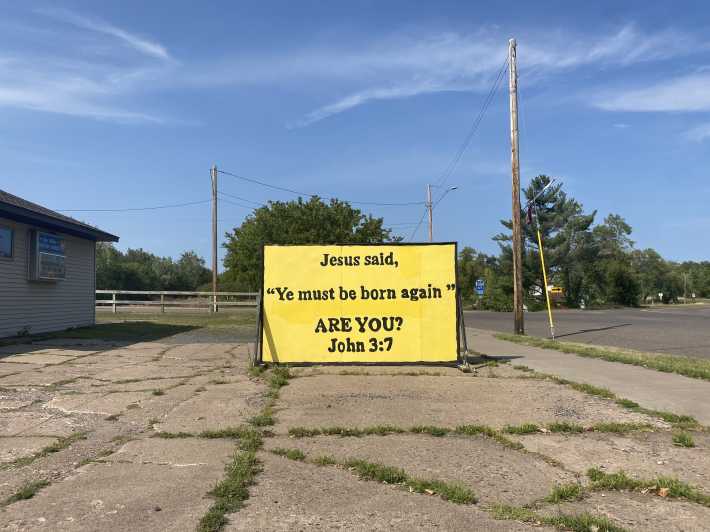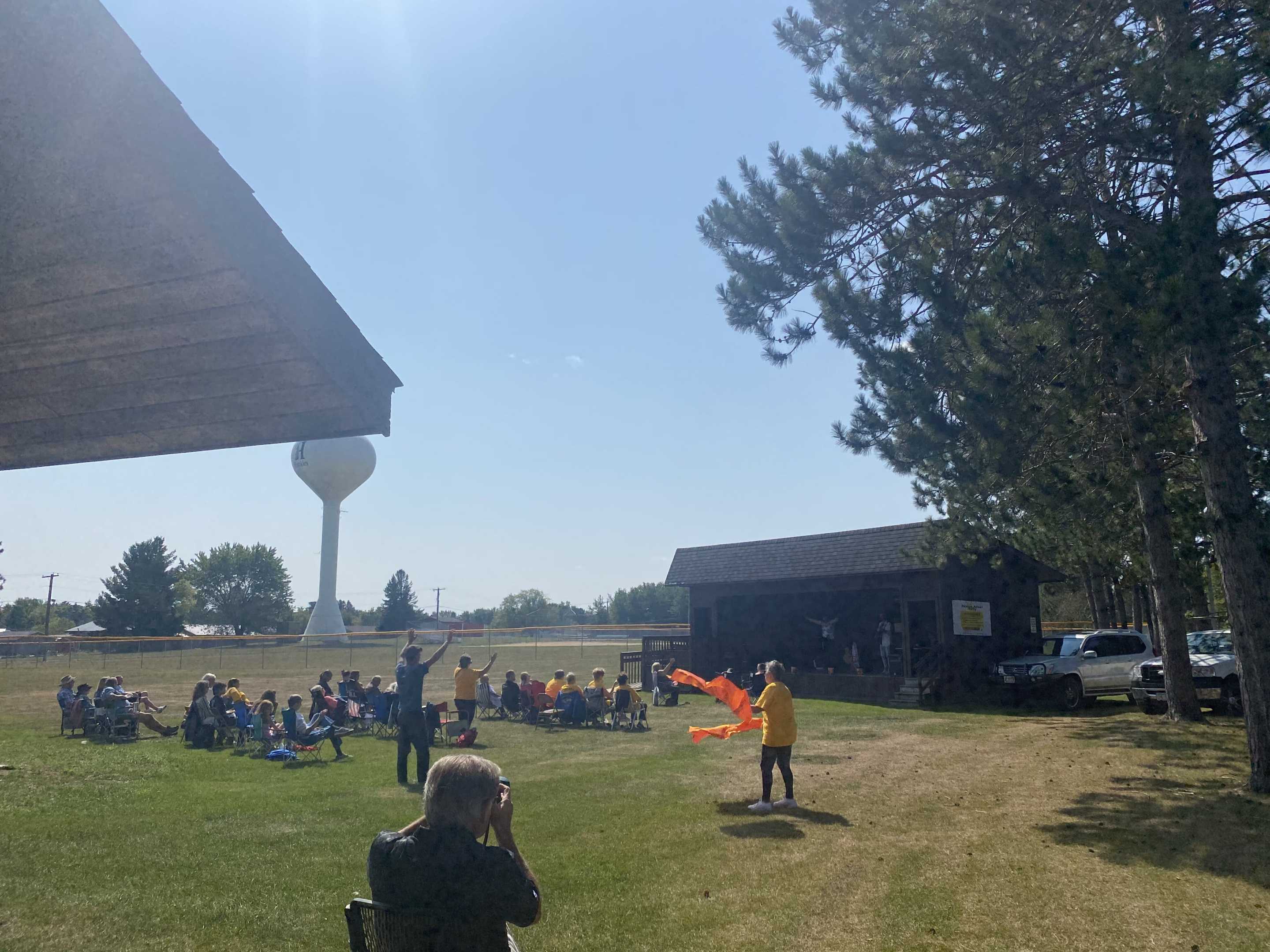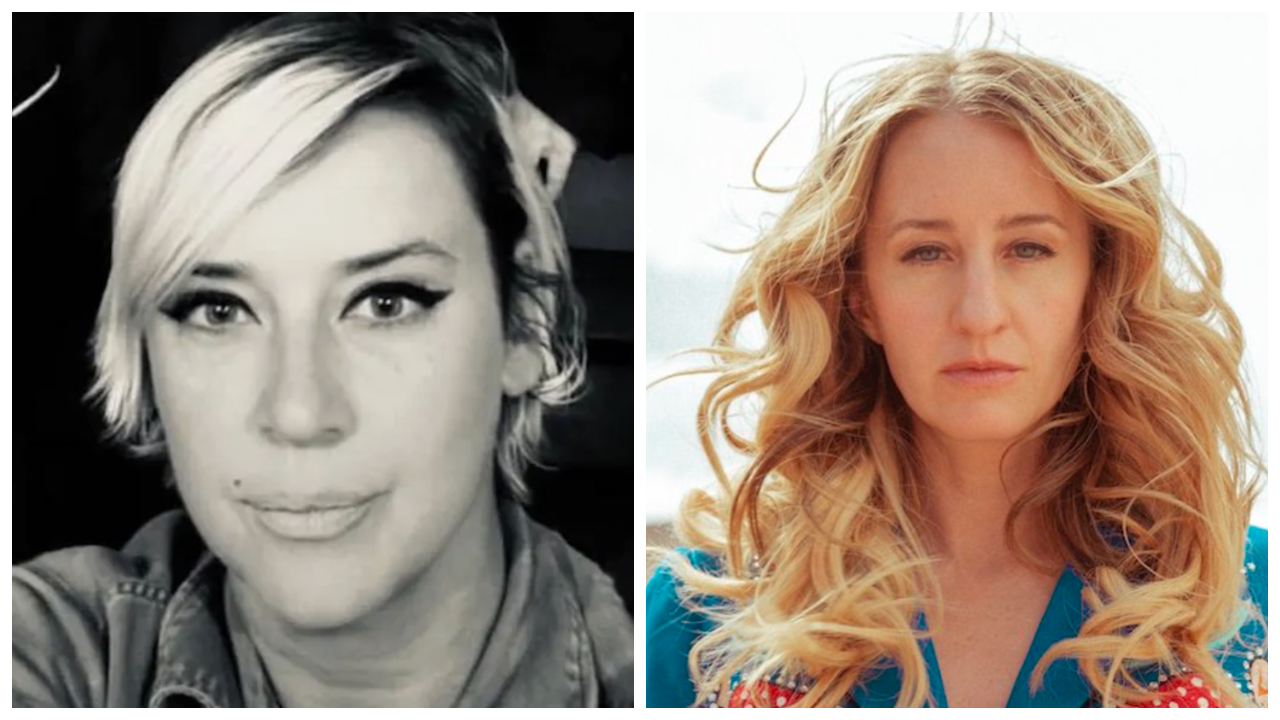9:59 a.m.
"God is the god of hope, God is the god of restoration."
Pastor Steve Ekholm, of Living Hope Church in Mora, Minnesota, kicks off the third day of the Revive Alive Rally, held this past Sunday in Hinckley. Around 50 people are seated either in lawn chairs or at picnic tables, overlooking the weathered brown pavilion and rolling green field while gentle guitar chords float from the PA system. At a small playground, a group of kids wearing flip-flops and cowboy boots play under the watchful eye of their father.
Ekholm begins to tell the crowd the story of how he came to his faith. As he speaks, worshippers occasionally walk to the edge of the stage, dropping money into one of five movie-theater-style popcorn buckets.
Tent revivals, a general term often used to describe a wide range of different religious gatherings dating back to the Great Awakening, usually refers to gatherings of passionate, zealous Christians who seek to pray for forgiveness, healing, or salvation. Their original popularity was spurred in part as a reaction to the secular rationalism of the time, and for people who felt their faith had gone dormant.
The events are usually held outdoors and can include faith healings, testimonials, and baptisms. (Erected near the pavilion is a blue, portable tub with a handrail that will be used later in the day for that latter purpose.) Images of the tent revival, as depicted in films like 2006 documentary Jesus Camp, have become attached to the concept of American evangelism. My surroundings of blue skies, pleasant music, and amicable older folks look very different.
Ekholm says that during last night’s rally, 10 people were healed of deafness. He was healed himself by God, he says, and is here because he wants other people to get that chance. Ekholm says he suffered from depression in his youth, and later alcoholism.
"If God can do it for me, he can do it for you,” he promises. “I was suicidal, I know what that feels like."
10:17 a.m.
"The spirit of poverty and brokenness will be lifted off of you,” Ekholm preaches.
"Yes," a woman sitting near me murmurs.
"Rural America has a rightful place at the table of kings," he continues. "God wants to restore things that have been lost in this town."
Small cheers and bouts of applause ripple in the crowd. As I move to a different table in the shade, I’m painfully aware of how much I stand out. Everyone has been very friendly to me so far, but I don’t know how long that would last if they knew I was transgender. My existence and acceptance here, unbeknownst to everyone around me, is conditional.
Mary Peltz, one of the organizers of the rally who spoke on a previous night, is the head pastor of Word of Life Ministries. On Word of Life’s website, articles about the COVID hoax, Q-Anon theories, and predatory LGBTs are linked alongside schedules for bible study. Ekholm’s church, in contrast, is part of the Assembly of God network, which is advocating for its parishioners to get vaccinated, though its positions on issues like LGBT and reproductive rights remain deeply conservative.
Someone cries out exuberantly in the rows of lawn chairs near the pavilion. A young man, barefoot and seated in the grass, sways gently to the rhythm of Ekholm's speech. Phrases like "job creation" and "financial prosperity" draw more agreement from the crowd.
Then, Ekholm begins describing the Great Hinckley Fire of 1842.
10:39 a.m.
From 1891 to 1894, unprecedented drought in central Minnesota sowed ripe conditions for wildfires. Newspapers of the time describe hot temperatures and smoke-filled days, not unlike what we've experienced this past summer. On September 1, 1894, strong winds powerful enough to send walls of hot, ash-filled air at Duluth pedestrians and launch fireballs of debris merged two rapidly growing wildfires, creating a vortex (or fire tornado) that engulfed and razed the city. The final toll was over 400 square miles of destruction, and 418 estimated dead, an estimate which historians now acknowledge is likely much higher.
Ekholm tells the crowd about a group of 100 survivors who lived by fleeing to the town’s gravel pit, long considered an eyesore, and submerging themselves in the shallow water, enduring blistering heat, until the fire finally died.
“That gravel pit became a miracle,” Ekholm says. “That’s where we’re standing today.”
One survivor, in his account of the time, described the event as "like Ragnarok," the Norse equivalent of the rapture.
11:14 a.m.
"God wants to restore things that have been lost in this town,” Ekholm says.
Small cheers and bouts of applause ripple in the crowd. The pastor tells his crowd that another fire will touch down in Hinckley. But it will be a fire of restoration.
"Lord," he cries, "break the spirit of trauma off this land."

11:42 a.m.
I approach one of the musicians from the beginning of the rally. He tells me his name is Todd Finney, but most people call him Papa Bear. Papa Bear is a pastor, based mostly in the Twin Cities and Mankato. He isn't a regular at these rallies, but says he likes to keep connected to the area.
"I'm Dakota,” he says. “We've been here on this land since the beginning of time."
Papa Bear is one of the organizers of the Dakota 38 + 2 Memorial Ride, a 300-mile 17-day ride on horseback from Lower Brule Indian Reservation in South Dakota to Reconciliation Park in Mankato, held annually in remembrance of the 38 Dakota men killed there in the largest mass execution in American history. Papa Bear is a descendent of one of those 38 men who were killed.
"I think there is a level of forgiveness that we can give that a lot of people can't," he says.
Papa Bear tells me his daughter is a queer DJ at the Saloon, and one of his sons is a Water Protector, on horseback, protesting Line 3. He doesn't shy away from the contradictions one might point out about his faith: "For us, that belief system was used to perpetuate one of the worst genocides of the entire world."
But Papa Bear points out that, if it were up to Jesus himself, he probably wouldn't have done that.
"I follow a little Jewish guy who walked through the desert and taught people how to love,” he explains. “You know, [Marx] said, religion is the opiate of the masses."
Papa Bear elaborates, likening back to his own experiences with religion when he was a child. The church he and his family attended was strict and punitive.
"The 'little c' church is a building, an institution," he says. The 'big C' church is people coming together to love one another and take care of each other."
Organized religion, he adds, is not always the path to loving God—or each other. At the beginning of his ministry career, Papa Bear says he dressed in khakis and polos, going as far as to cover his many visible tattoos with makeup, in order to fit in.
"But then I thought, 'God made me, and God made me Dakota,'” says.
Sitting next to me in shorts and a black tank top, Papa Bear's tattoos are on full display. His hair is long and braided, and he tells me he occasionally sports a mohawk, too. He enjoys the looks he gets as a visiting pastor: "They're like… 'Are you supposed to be here?'"
I ask him if he feels like this rally's message appeals to those who feel alienated from mainstream religion.
"Absolutely,” he says. “They're tired of being made to feel shame. And fear."
12:36 p.m.
"People need to know that there are consequences for sin."
Jenny, a pastor from Pine City, tells me that she hopes this rally's message connects with people in recovery, the homeless, and survivors of sex trafficking. I ask if she thinks those are issues people in this area are facing.
"Yes. They need Jesus the most," she says. "People should know what He can do for them."
She tells me that, early in her life, she felt that God had turned his back on her.
"But really," she says, "I had turned my back on him."
During this time, Jenny says she drank heavily, and got mixed up with destructive people. I ask her what happened that made her feel as if God had abandoned her.
"I was raped," she says, with a candor that takes my breath away. Between her words and Pastor Ekholm's testimonial, I am reeling from the naked vulnerability of these strangers.
Jenny tells me that some of the girls she knew during this time were involved in drugs and sex trafficking. She was trying to protect one of her friends when her rape occurred.
"I blamed God, when I should've blamed myself," she says. "[My rapist] too, but it was my fault for putting myself in that situation."
I ask when she decided to return to her faith. She tells me that during her previous marriage, her ex-husband was abusing her, and had been for years. He had convinced her that if she left, he'd gain custody of the children, and she'd never see them again. She was willing to endure the abuse as long as the kids were safe.
"I thought he was a good father," she says.
Then she discovered he had been abusing one of her daughters from a prior marriage. She fled, took the kids, and had him arrested. She stopped drinking and got her life back together.
"I sure didn't do that," she says. "I was struggling. God did that for me."
She tells me she wants people to know what God can do, and what he is capable of. Most importantly, that everyone can be saved.
1:12 p.m.
A smiling woman leans over to me and asks if I’m in recovery. I’m not offended; I clearly look the part of an outsider. I’m frankly relieved no one’s sussed me out as a transsexual, so being pegged as an addict is a welcome alternative. I tell her no, that I’m not, which is partially true.
When I was 17, part of my discharge agreement with the psych ward I'd been checked into was attending six months of group and individual therapy, which I dodged until I was 21. In one session, my individual therapist said, "I want to read you something from the Bible, but disregard that aspect." She knew I wasn't religious. She read the passage, and after, I got why she read it to me.
Ecclesiastes 3: “To every thing there is a season, and a time to every purpose under the heaven: A time to be born, and a time to die; a time to plant, and a time to pluck up that which is planted. A time to kill, and a time to heal; a time to break down, and a time to build up; A time to weep, and a time to laugh; a time to mourn, and a time to dance.”
For someone struggling, the idea that one's conditions are temporary, one stop on the never ending cycle of growth and decay, is comforting and reassuring. That's probably why it's such a prevalent theme in different belief systems.
When Ekholm reads the same passage, my skin tingles, and the crowd hums in agreement.






